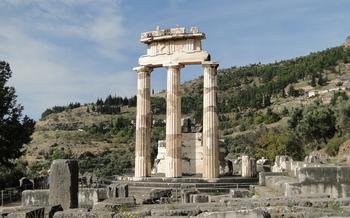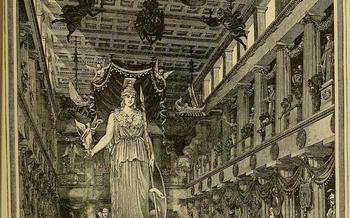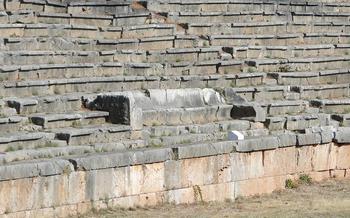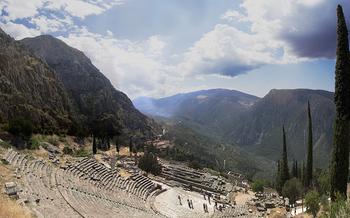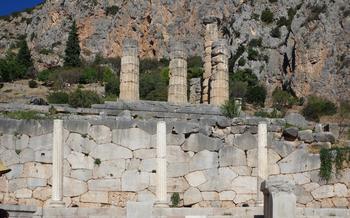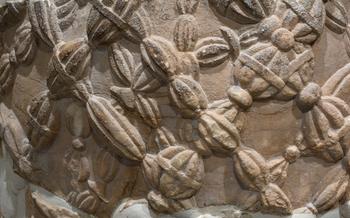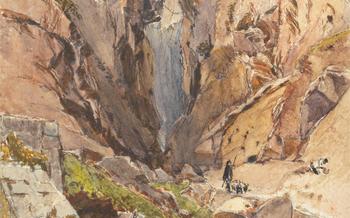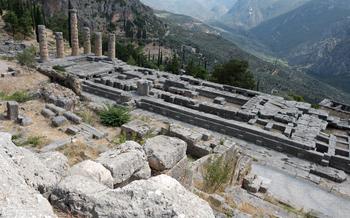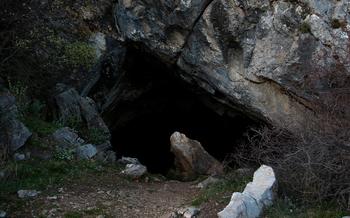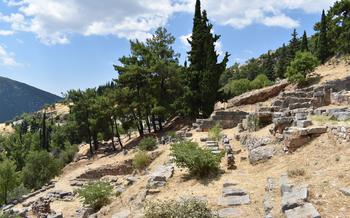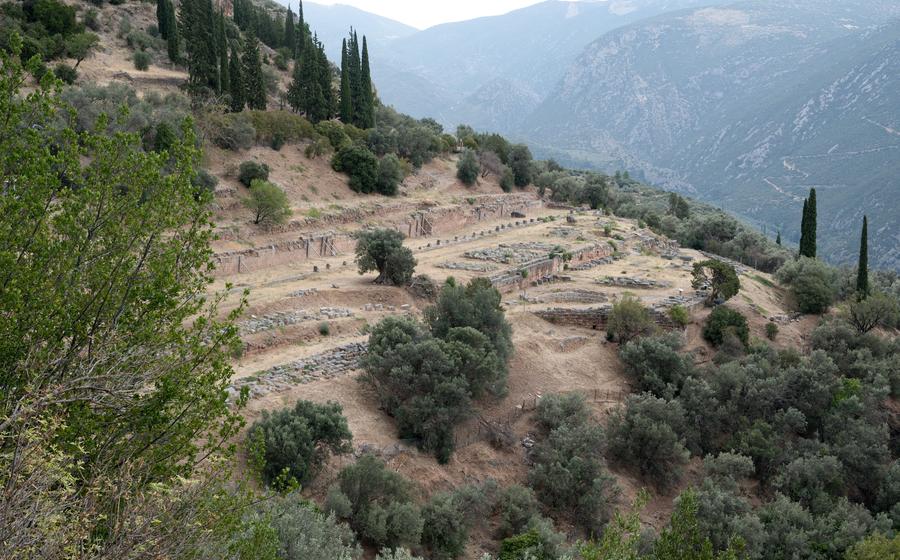
Archaeological site of Delphi
- Delphi: A Place of Antiquity and Wonder
- Unveiling the Oracle of Delphi
- The Sanctuary of Apollo
- The Castalian Spring
- The Tholos of Delphi: A Unique Symbolism
- The Stadium of Delphi: Ancient Sports and Religious Festivals
- The Museum of Delphi: A Treasure Trove of Ancient Discoveries
- Breathtaking Views and Natural Beauty
- The Village of Delphi
- The European Cultural Centre of Delphi
- The Oracle's Legacy in Modern Times
- Planning Your Visit to Delphi
- Practical Tips for a Memorable Experience
- Insider Tip: A Unique Perspective
Delphi: A Place of Antiquity and Wonder
In the heart of Greece, nestled amidst the stunning natural landscapes of Mount Parnassus, lies the ancient city of Delphi, a place steeped in history, mythology, and cultural significance. As one of the most important religious and political centers of the ancient world, Delphi served as a sacred oracle for over a thousand years, attracting pilgrims, rulers, and seekers of divine guidance from all corners of the Hellenic world. It was here, in the shadow of the sacred mountain, that the renowned oracle of Delphi, the Pythia, delivered her enigmatic prophecies, influencing the course of history and shaping the destiny of nations.
Delphi's archaeological treasures, including the ruins of temples, theaters, and treasuries, stand as testaments to its glorious past. The site is a treasure trove of ancient artifacts, offering visitors a glimpse into the religious beliefs, cultural practices, and artistic achievements of this remarkable civilization. The stunning natural surroundings, with its rugged cliffs, olive groves, and panoramic views of the valley below, add to the awe-inspiring atmosphere of this sacred place.
Unveiling the Oracle of Delphi
Delphi's reputation as a sacred oracle resonated throughout the ancient Greek world. The Pythia, a priestess chosen for her purity and piety, delivered prophecies in a trance-like state, believed to be inspired by the god Apollo. Her cryptic utterances, often ambiguous and open to interpretation, were eagerly sought by city-states, kings, and individuals seeking guidance on matters of war, politics, and personal life.
The oracle's influence extended beyond Greece, attracting visitors from across the Mediterranean. Its reputation for accuracy and wisdom earned it reverence and respect from various cultures. The pronouncements of the Pythia shaped the course of history, influencing decisions that affected the lives of countless people.
The oracle's sacred status and the belief in its divine connection to Apollo contributed to its profound impact on ancient Greek society. It served as a unifying force, bringing together city-states that shared a common religious and cultural heritage. The oracle's prophecies played a pivotal role in shaping the political and cultural landscape of the ancient world, leaving an enduring legacy that continues to fascinate and intrigue to this day.
The Sanctuary of Apollo
Deep within the archaeological site of Delphi lies the Sanctuary of Apollo, the heart of the ancient religious complex. Centuries ago, this sacred ground was a place of pilgrimage and worship, where people sought guidance from the Oracle and paid homage to the gods. Today, the ruins of temples, altars, and offerings stand as silent witnesses to the rich history and rituals that once took place here.
The Sanctuary of Apollo was the epicenter of religious activity in Delphi. It was home to the Temple of Apollo, the most sacred structure in the sanctuary, where the Oracle delivered her prophecies. Surrounding the temple were numerous smaller temples, altars, and treasuries, each dedicated to a different deity or city-state.
One of the most significant structures within the sanctuary was the Altar of Apollo, where sacrifices and offerings were made to the god. The remains of this altar, along with various other offerings, provide a glimpse into the rituals and practices that took place in the sanctuary.
The Sanctuary of Apollo was not merely a place of worship; it was also a place of assembly and celebration. During the Pythian Games, held every four years, athletes, artists, and pilgrims from all over Greece gathered in the sanctuary to honor Apollo and compete in various contests. These games were not just sporting events but also religious festivals, with processions, sacrifices, and musical performances taking place in the sanctuary.
Venturing into the Sanctuary of Apollo is like stepping back in time, experiencing the grandeur and spirituality of ancient Greece. The ruins, though weathered by time, still exude a sense of awe and reverence, inviting visitors to contemplate the profound significance of this sacred place.
The Castalian Spring
On the slopes of Mount Parnassus, visitors can discover the revered Castalian Spring, a natural spring of immense significance in Greek mythology and history. Ancient Greeks believed the spring held mystical powers, a sacred source of purification and inspiration. Ritual cleansing in its waters was a prerequisite for those seeking prophecies from the Oracle of Delphi or participating in religious ceremonies.
The spring's connection to the Muses, goddesses of the arts, further enhanced its allure. It was believed that drinking from its waters could bestow artistic inspiration and poetic talent. Poets, musicians, and artists would make pilgrimages to the spring, seeking divine favor and creative enlightenment.
Legends and traditions abound, weaving a tapestry of myth around the Castalian Spring. One tale speaks of the nymph Castalia, who was pursued by the amorous god Apollo. To escape his advances, she transformed herself into a spring, giving rise to the Castalian Spring's existence.
Today, visitors can still marvel at the spring's natural beauty and cultural significance. Its waters continue to flow, a testament to Delphi's enduring legacy and the enduring power of myth and tradition.
The Tholos of Delphi: A Unique Symbolism
Amidst the ruins of Delphi, the Tholos of Delphi stands as a unique and captivating structure. This circular building, constructed in the 4th century BCE, served as a meeting place for religious ceremonies and consultations with the Oracle of Delphi. Its distinctive architecture and symbolism make it one of the most intriguing landmarks of the archaeological site.
The Tholos is composed of 20 Doric columns arranged in a circular formation, supporting a conical roof. The interior features a central chamber with a stone bench running along the perimeter, where participants would gather for meetings and consultations. The building's circular design symbolizes the unity and harmony of the cosmos, reflecting the spiritual significance of the site.
Scholars believe that the Tholos was closely associated with the Oracle of Delphi. It is theorized that the Pythia, the priestess who delivered the oracles, may have conducted her rituals and prophecies within this sacred space. The building's unique acoustics, with echoes reverberating throughout the chamber, may have contributed to the mystical atmosphere and heightened the sense of awe and reverence among visitors.
Today, the Tholos of Delphi stands as a testament to the architectural ingenuity and spiritual significance of ancient Greece. Its circular form and symbolic associations continue to intrigue visitors, inviting them to contemplate the mysteries of the oracle and the profound spiritual beliefs of the ancient world.
The Stadium of Delphi: Ancient Sports and Religious Festivals
Nestled amidst the archaeological treasures of Delphi, the ancient stadium stands as a testament to the city's sporting and religious heritage. Built in the 5th century BC, this impressive structure hosted the renowned Pythian Games, a prestigious event that rivaled the Olympic Games in significance.
The stadium's design reflects the ingenuity of ancient Greek architects. With a length of 178 meters and a width of 25 meters, it accommodated up to 7,000 spectators, who would gather to witness thrilling athletic competitions. The seating arrangements, carved into the natural slope of the hill, provided an amphitheater-like experience, ensuring an unobstructed view for all.
The Pythian Games, held every four years, featured a variety of athletic contests, including footraces, wrestling, boxing, and chariot races. These events were not merely sporting competitions but also sacred rituals deeply intertwined with religious beliefs. Victories were celebrated as divine blessings, and athletes were honored as heroes.
Beyond the Pythian Games, the stadium served as a venue for religious festivals and ceremonies. Processions, musical performances, and theatrical presentations took place within its hallowed grounds, creating a vibrant atmosphere of devotion and entertainment.
Today, visitors to the stadium can still sense the echoes of ancient cheers and witness the grandeur of this remarkable structure. The well-preserved seating rows, starting line, and judges' platform transport visitors back in time, offering a glimpse into the sporting and religious traditions of ancient Greece.
The Museum of Delphi: A Treasure Trove of Ancient Discoveries
Within the confines of the archaeological site, nestled amidst the ruins and remnants of antiquity, lies a treasure trove of artifacts and knowledge—the Museum of Delphi. This remarkable institution serves as a repository for the countless discoveries unearthed from the sacred precincts of Delphi.
Within its walls, visitors embark on a chronological journey through the storied history of Delphi, from its humble beginnings as a religious sanctuary to its rise as a renowned oracle and cultural hub. An array of awe-inspiring sculptures, intricate inscriptions, and everyday objects from ancient times paints a vivid picture of life in this sacred city.
Among the highlights of the museum's collection are the iconic Charioteer of Delphi, a bronze masterpiece that epitomizes the artistic prowess of ancient Greece, and the enigmatic Sphinx of Naxos, a haunting creature that once guarded the sacred way leading to the oracle.
The Museum of Delphi not only preserves these priceless artifacts but also provides invaluable insights into the religious beliefs, rituals, and cultural practices of the ancient Greeks. It is a place where history comes alive, where visitors can connect with the past and gain a deeper understanding of this extraordinary site.
Breathtaking Views and Natural Beauty
Delphi's stunning natural surroundings complement the ancient ruins, creating a harmonious blend of history and nature. Panoramic vistas from the archaeological site offer breathtaking views of the rugged cliffs, sprawling olive groves, and majestic Mount Parnassus, the legendary home of Apollo and the Muses.
Scenic hiking trails wind through the picturesque landscape, inviting visitors to explore the natural wonders of the region. Take a leisurely stroll amidst the olive trees, marveling at their gnarled trunks and silvery leaves that shimmer in the sunlight. Ascend the slopes of Mount Parnassus, breathing in the invigorating mountain air and enjoying panoramic views that stretch for miles.
For a unique perspective, witness the sunrise or sunset from the archaeological site. As the golden rays illuminate the ancient ruins and cast long shadows across the landscape, you'll feel a profound connection to the sacredness of Delphi. Capture the beauty of this magical moment with your camera, creating lasting memories of your visit.
Pack a picnic lunch and find a secluded spot amidst the ancient ruins to savor the flavors of local delicacies while surrounded by history. Indulge in fresh bread, ripe olives, tangy feta cheese, and juicy fruits, all while taking in the awe-inspiring views.
Venture beyond the archaeological site to discover the nearby villages of Arachova and Galaxidi. Arachova, perched on the slopes of Mount Parnassus, exudes traditional charm with its cobblestone streets, whitewashed houses, and vibrant atmosphere. Galaxidi, a picturesque coastal village, offers stunning views of the Gulf of Corinth and invites you to explore its charming harbor and sandy beaches.
The Village of Delphi
Nestled between Mount Parnassus and the Gulf of Corinth, the village of Delphi invites you to immerse yourself in its welcoming atmosphere. Whether you seek a relaxing retreat or an adventurous exploration, Delphi offers a diverse range of accommodation options, from traditional guesthouses to modern hotels, catering to every budget and preference. Delight your palate with authentic Greek cuisine at charming tavernas, savoring the flavors of freshly caught seafood, succulent meats, and aromatic herbs.
For a unique shopping experience, meander through the village's narrow streets, where you'll find an array of local crafts, souvenirs, and organic products. Engage with the friendly locals, known for their warm hospitality and willingness to share stories about their beloved village. Guided tours and cultural experiences provide an in-depth understanding of Delphi's rich history and traditions, offering a glimpse into the lives of its ancient inhabitants. Delphi serves as an ideal base for exploring not only the archaeological site but also the surrounding region, with its picturesque villages, stunning landscapes, and hidden gems waiting to be discovered.
The European Cultural Centre of Delphi
The European Cultural Centre of Delphi stands as a beacon of modern cultural expression nestled amidst the ancient ruins of Delphi. This contemporary institution serves as a platform for art exhibitions, performances, and seminars, fostering cultural dialogue and exchange.
Through its diverse programs, the centre promotes the exploration of contemporary artistic practices and encourages interdisciplinary collaborations. It hosts renowned artists, scholars, and thinkers from around the world, creating a vibrant space for cultural discourse and innovation.
The centre's mission is to enhance the cultural landscape of Delphi, bridging the gap between its ancient legacy and modern artistic expressions. It offers a unique opportunity to experience the interplay of history and contemporary creativity within the sacred surroundings of this iconic site.
The Oracle's Legacy in Modern Times
The Oracle of Delphi has left an indelible mark on Western culture, philosophy, and the arts. Its influence can be seen in literature, art, music, and even contemporary thought. The concept of prophecy, as embodied by the Oracle, has been explored and reimagined by countless artists and thinkers throughout history.
The Oracle's enigmatic pronouncements and the mysterious rituals associated with it have captivated the imagination of people for centuries. Its legacy continues to inspire and fascinate, leading to ongoing exploration of the site and its secrets.
The Oracle's influence can be seen in the works of ancient Greek playwrights such as Sophocles and Euripides, who often used the Oracle as a plot device to explore themes of fate, destiny, and the limits of human knowledge. In modern times, the Oracle has been referenced in works by poets, novelists, and philosophers, including Friedrich Nietzsche, Sigmund Freud, and Carl Jung.
The Oracle's enduring legacy serves as a reminder of the power of mystery and the human fascination with the unknown. Its influence on modern culture underscores the enduring impact of ancient Greek civilization and its contributions to the development of Western thought.
Planning Your Visit to Delphi
To ensure a memorable experience in Delphi, careful planning is essential. The best time to visit is during the shoulder seasons, from April to May and from September to October, when the weather is pleasant, and crowds are smaller. During the summer months, temperatures can soar, making it less enjoyable to explore the site under the scorching sun.
To navigate the site effectively, consider starting from the upper part and gradually descending. This allows you to explore the highlights, such as the Temple of Apollo, the Treasury of the Athenians, and the Tholos, while avoiding the crowds that tend to gather in the lower areas.
The duration of your visit depends on your interests and the level of detail you wish to explore. Allocate at least half a day to thoroughly experience the archaeological site and the museum. If time permits, consider combining your visit to Delphi with other destinations in the region, such as the Meteora monasteries, the island of Evia, or the picturesque town of Nafplio.
Delphi is easily accessible by public transportation, with regular buses and trains connecting it to major cities like Athens and Thessaloniki. Rental cars offer more flexibility for exploring the surrounding area at your own pace.
Practical Tips for a Memorable Experience
To make the most of your visit to Delphi, there are a few practical considerations and tips to keep in mind:
-
Choose comfortable footwear: Delphi's archaeological site involves a lot of walking on uneven surfaces, so comfortable shoes are essential.
-
Don't forget sun protection: Greece is known for its sunny weather, so remember to bring sunscreen, sunglasses, and a hat to protect yourself from the sun's rays.
-
Bring water and snacks: While there are a few cafes and restaurants near the site, it's advisable to bring your own water and snacks, as options on-site may be limited and expensive.
-
Respect the sacredness and history of the site: Remember that Delphi was a sacred place in ancient Greece, so please be respectful of its history and significance. Avoid touching or climbing on the ruins, and refrain from loud or disruptive behavior.
-
Follow local customs and traditions: When visiting Delphi, it's important to be mindful of local customs and traditions. Dress appropriately, be courteous to the locals, and avoid any actions that may be considered disrespectful or offensive.
Insider Tip: A Unique Perspective
To fully immerse yourself in the magic of Delphi, consider visiting during the golden hours of sunrise or sunset. As the first rays of light bathe the ancient ruins in a warm glow, you'll feel transported back in time, experiencing the site in a way few others do. Alternatively, pack a picnic lunch and find a secluded spot amidst the ruins to savor the tranquility and natural beauty of the surroundings.
Delve deeper into the region by exploring the nearby village of Arachova, a picturesque mountain town with cobblestone streets, traditional architecture, and stunning views of the valley. For a taste of coastal charm, take a drive to the seaside village of Galaxidi, known for its colorful houses, quaint harbor, and delicious seafood. These hidden gems offer a delightful contrast to the ancient wonders of Delphi, providing a well-rounded experience of the region's rich cultural heritage and natural beauty.
